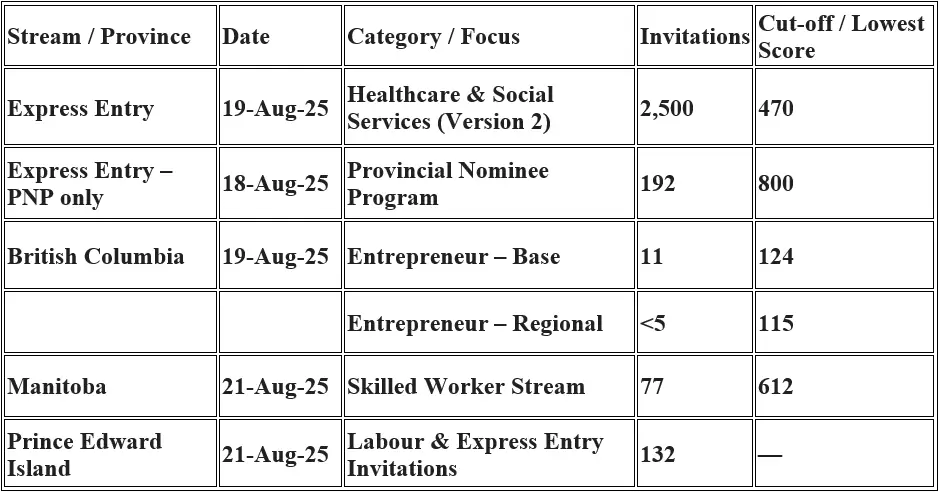
Explore the latest ImmPulse Weekly for key Canadian immigration insights—or browse past editions to catch up.
Canada’s Start-Up Visa (SUV) program, launched in 2013 to attract innovative entrepreneurs, is facing mounting pressure as applications pile up and refusal rates climb. As of 2025, there are 17,919 SUV permanent residence applications in the system, with an average processing time of 52 months. The federal government has reduced annual business immigration spots from 5,000 in 2024 to 2,000 in 2025, and further down to 1,000 for 2026 and 2027.
Refusal rates have spiked: in the first quarter of 2025, 73% of incubator-based SUV PR applications were refused (up from 10% in 2023), while 85% of those through angel investor networks were refused (up from 18% in 2023). Work permit refusals for SUV applicants also rose to 77%, compared with 55% the year before, with only 3,345 approved work permits out of all pending PR cases.
Ottawa has capped each designated organization to 10 SUV PR applications per year and now prioritizes cases with venture capital or angel investor funding. While these measures are intended to address backlogs and improve integrity, critics argue they risk disadvantaging genuine innovators and favouring those who can afford higher costs. Proposals under review include replacing the current designated-organization model with a ranking system tied to investment, business track record, and alignment with priority sectors, as well as reintroducing investor programs tied to job creation and regional development. (Toronto Star)
Economists and migrant advocates are pressing the federal government to account for Canada’s estimated 500,000 undocumented residents as it consults on immigration levels for 2025–2027. Critics argue ignoring this population distorts housing, labour, and service planning. While Ottawa previously promised a regularization program, only a small construction-worker pathway has been floated so far. (The Globe And Mail)
Fresh IRCC statistics reveal a sharp drop in new temporary residents in early 2025: international students fell to 36,000 (from 125,000), new work permits to 119,000 (from 245,000), and asylum claims to 57,000 (from 91,000). The government says this proves its measures are slowing growth, though backlogs continue to rise with more than 2.2 million applications pending. (Toronto Star)
A 51-year-old U.S. Army veteran, Dan Livers, crossed the Detroit River by kayak and claimed asylum after landing in LaSalle, Ontario. He says he fears persecution in Michigan and hopes to find peace in Canada. While he has temporary status, experts note U.S. citizens face very slim chances of being recognized as refugees under Canadian law. (CBC News)
(Source)
Issue: Whether refusal of a Quebec Investor Class PR application for lack of intent to reside was unreasonable or procedurally unfair.
Facts:
Court Findings:
Outcome: Application dismissed.
Why This Case is Important:
Signals that vague or last-minute relocation evidence will not meet the high standard for investor program residency intent.
Issue: Whether refusal of TRVs based on boilerplate reasoning was reasonable.
Facts:
Court Findings:
Outcome: Application granted; refusals set aside. No remittal ordered since trip date passed; applicants free to reapply, to be assessed by different officer.
Why This Case is Important:
Issue: Whether refusal of a work permit with inadmissibility finding for misrepresentation (fraudulent bank statement) was unreasonable or unfair.
Facts:
Court Findings:
Outcome: Application dismissed.
Why This Case is Important:
Reinforces importance of providing a full and relevant PFL response.
Issue: Whether the refusal of a humanitarian and compassionate (H&C) exemption from IRPR s. 117(9)(d) (undeclared spouse rule) was unreasonable or procedurally unfair.
Facts:
Court Findings:
Outcome:
Application dismissed.
Why This Case is Important:
Issue: Whether an officer’s refusal of a principal applicant’s refugee permanent residence application for misrepresentation (failure to disclose past visas and passport) was unreasonable due to silence on the dependants’ applications.
Facts:
Court Findings:
Outcome: Application granted; matter remitted to a new officer; dependants added to style of cause; no certified question.
Why This Case is Important:
Issue: Whether an officer unreasonably refused an H&C PR application based on establishment and best interests of Canadian children.
Facts:
Court Findings:
Outcome: Application dismissed.
Why This Case is Important:
Highlights applicant’s responsibility to provide robust country condition and hardship evidence.
Issue: Whether the IAD acted unreasonably in refusing to convert a failed spousal sponsorship appeal to a conjugal partner application (“Tabesh conversion”).
Facts:
Court Findings:
Outcome: Application dismissed.
Why This Case is Important:
Affirms IAD can refuse conversion where record is bare, and new sponsorship application is often preferable.
Issue: Whether the IAD unreasonably found that a spousal sponsorship marriage was entered primarily for immigration purposes under IRPR s.4(1).
Facts:
Court Findings:
Outcome: Application dismissed.
Why This Case is Important:
Shows deference to IAD fact-finding where reasoning is transparent and evidence is weighed.

For comprehensive legal analysis or strategic case support, contact Greenberg Hameed PC.
The content of this bulletin is for informational purposes only, and is not intended to provide or be relied on as legal advice.
in**@*************ed.com
Click on the blurred section to reveal the full email address.
Suite 2079 – 325 Front Street West, Toronto, ON, M5V 2Y1
Business hours
Monday to Friday: 9 a.m to 5 p.m
Saturdays:
Sundays: Closed
View our full Privacy Policy.